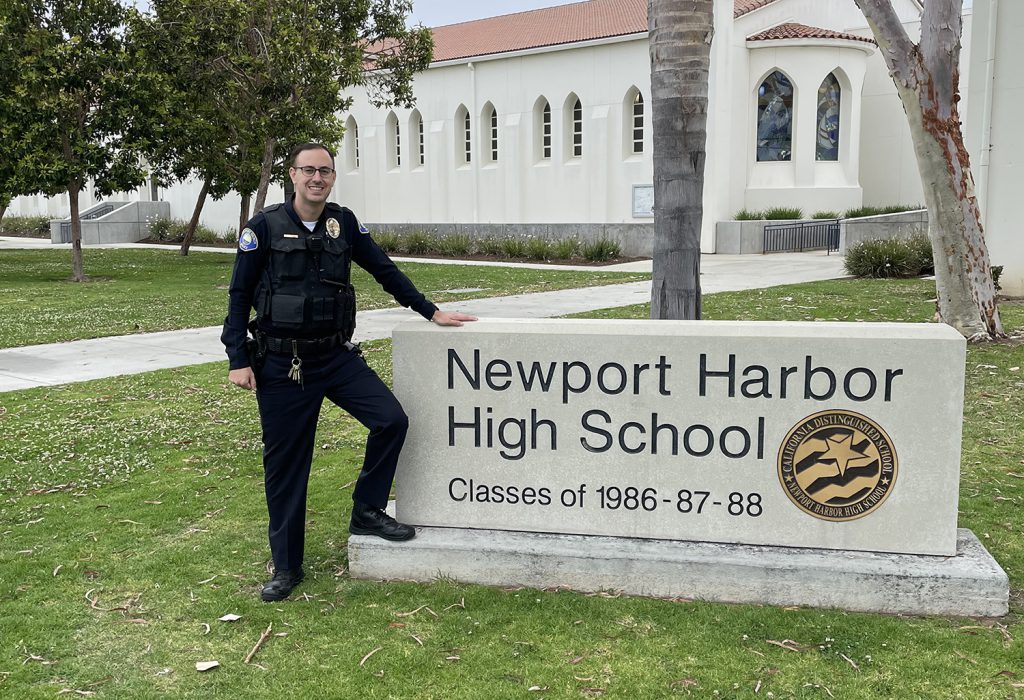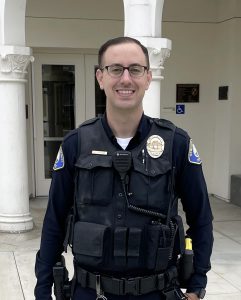
Being born and raised “in a very religious household” and ultimately having earned his degree in Biblical Studies and Theology with a minor in communications, it should come as no surprise that 31-year-old Garrett Gergins is “passionate about religion.”
But he’s also passionate about his current post: School Resource Officer (SRO) with the Newport Beach Police Department.
Out of uniform, Gergins looks just about as young as most seniors at Newport Harbor High School — where he is stationed four days a week.
Gergins began his law enforcement career with the Pasadena PD, but shifted three years ago to Newport. Although he found Patrol to be “enjoyable,” he finds being an SRO both enjoyable and “definitely different.”
Where patrol is “broad police work,” Gergins apprised, “the SRO focuses on the school and juvenile crime issues.” He and the department’s two other SROs work closely alongside social workers, as well as with administrators, faculty and cooperative parents. His pastoral calm seems ideal for an environment where raging hormones often dictate behavior and questionable decisions.
On a daily basis, Gergins interacts with a daily student/staff population exceeding 2,000 during the school year, not including the myriad visitors who have on-campus appointments, or those random wanderers who just seem to materialize on the grounds of this “open campus.”
After one and one-half years (much of it affected by Covid restrictions), Gergins is now getting to either know or recognize all of the students. And many of them are acknowledging him, even coming up to talk, he said.
The officer identifies his major responsibility as the “overall safety of students and staff, as well as giving support when necessary with disciplinary issues.” He also sees his job as one of education, especially in the areas of drugs, other negative behaviors and internet safety”.

Being an SRO is both reactive and proactive. “As an SRO, I want to be actively looking for safety concerns, finding ways to reach out to kids who might be struggling, and hoping to prevent something bad from happening,” Gergins shared.
Like any profession, especially in police work, there are many daily challenges. “No situation is the same, and there’s no black and white way to handle a situation, said Gergins. “We have to find a solution for each kid, for each scenario.”
A minority of students require a bit more attention than the others — there are always problem kids. Gergins supports the team approach to arrive at solutions for unique problems, a team consisting of police, administrators, teachers, social workers, psychologists and sometimes parents.
And, as in society at large, there are always problems.
“Right now we’re seeing a lot of vaping (nicotine and THD cannabis) both on and off campus,” Gergins said. The kids are leaving campus to inhale, while some will sneak its use on campus whenever and wherever possible.
Nationwide, the internet presents dangers that are of constant concern to law enforcement.
“Be smart online,” Gergins emphasizes. “Kids just can’t imagine not being on social media. There is a delicate balance between free speech and inappropriateness, both in receiving and transmitting messages” that include such communications as “threats, explicit materials, sexual exposure and sexual predation.”
Other SRO concentrations include stopping bike thefts, preparation for any major events, including natural disasters, and/or someone on campus with a weapon.
Currently, the PD is working with sworn personnel on active shooter response training at all of the campuses in the city. In this case, familiarity breeds greater chances of success.
Although threats are rare, Newport Harbor did experience threats from a troubled boy recently against the school principal and teachers. The PD learned about this through an in-school-online service called Text Tips, used by both students and teachers. Because of preemptive action by the PD, the threats were unfulfilled.
Communications proved to be the preventative. In fact, verbal communications is the “weapon” Gergins prefers to employ when necessary in order to “disarm” calmly and peacefully.”
The PD now subscribes to a new nationwide program called the Standard Response Protocol, “a uniform planned and practiced response to any potential incident being the foundation of a safe school, from crime to weather events.”
As Gergins sees it, “I’m not on campus to get students in trouble. My job is to let students have a good experience with law enforcement, and to be somebody that is there to support them and to encourage them to succeed.”
But in fulfilling that vision, Gergins admits that “I do need a lot of patience.”
